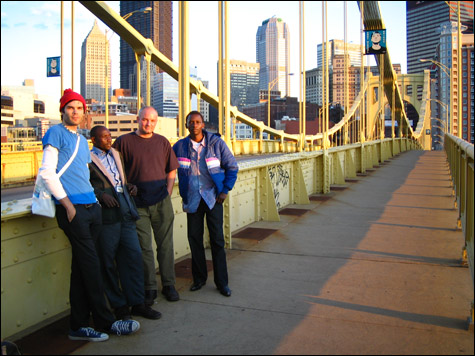
GOLD SOUNDS: The curious music of Extra Golden is a story that sounds simple but was realized only through extreme difficulty. |
Writing about Extra Golden, you’re tempted to focus on the novelty: two indie-rock dudes taking off to Nairobi to jam with a pair of benga masters sounds like the premise for some awful Jack Black movie. (Please don’t please don’t.) The subsequent stateside visit to play a festival, the series of visa nightmares, and the divine intervention of Barack Obama (not joking) could make a great sequel. And the music — some hamfisted hybrid of butt rock and benga, shredded out on a tooled-up nyatiti — could be a hit soundtrack. For a week.
But the curious music of Extra Golden is a more detailed, less straightforward story that sounds simple but was realized only through extreme difficulty. It’s overtly non-ironic in approach, and utterly earnest in spirit — another tough sell in times when all musical curiosity is cut down as “co-opting.” In short, it sounds better than it sounds on paper.
Alex Minoff and Ian Eagleson started the band then known as Golden 15 years ago. In an indie-rock climate that favored chilly distance over visceral kicks, Golden came on like a summer storm, with all sorts of gruff riffage and brute force. Aside from some flourishes, they didn’t sound that preoccupied with urbanized strains of African folk. But according to Minoff, “people’s interests change,” and shortly after their split in 2002, Eagleson left for Kenya to study toward his PhD in ethnomusicology.
Within a year, Eagleson grew close with vocalist Otieno Jagwasi as well as drummer Onyango Wuod Omari. After some successful jammage, he invited Minoff to visit him in Nairobi. And though this, the birth of Extra Golden (who come to the MFA this Wednesday), would be the part where things get a little wacky in our movie version, Minoff was surprised at how normal much of it seemed.
“There are a lot of similarities between benga and rock. The chords are the same; the bands have the same set-up; they’re playing every night in clubs.” And the clubs themselves, though open to the elements, weren’t so different from the sparsely outfitted basements every indie-rocker knows well. The resulting album, Ok-Oyot System (Thrill Jockey), glowed with a let’s-do-this attitude (it was recorded outside with a laptop, a couple of mics, and one amp), and also a enchanting simplicity (benga typically relies on a single key, repetitive rhythms, and trickling guitars). That the music’s greatest feat was its modesty didn’t tickle wacky expectations. And the AIDS-related death of founding member Otieno Jagwasi before the album was released lingered as a dour reminder of the realities beyond the bio.
A song to Jagwasi opens Extra Golden’s latest, Hera Ma Nono (“love in vain”). Like much benga, “Jakolando” is an exuberant vehicle for crushing melancholy. “You and I have an association that a melancholy song needs a minor chord,” says Minoff. “A minor chord doesn’t mean something sad to someone who plays benga.”
A joyous spirit carries Nono despite its pervasive sadness, often dipping into serious riffage, as on the revitalized Golden track “Street Parade.” It’s a step up and forward in just about every regard for the band, who’re now fronted by the esteemed Nairobi singer Opiyo Bilongo. Recorded in a house in the Poconos (during snow, a treat for Bilongo and Omari) with a host of microphones, mixers, and gadgetry, Nono is a more clearly realized collaboration — but it’s also a more measured balance of its dueling influences, and as such a far odder (and more satisfying) duck than any screenwriter could dream up. Minoff takes pride in this hard-fought-hybrid. “There’s a lot of good benga records out there, you know? So we didn’t need to make another one.”
EXTRA GOLDEN + DABY TOURÉ | Museum of Fine Arts, 360 Huntington Ave, Boston | July 30 at 7:30 pm | $30 | 617.369.3306 or www.mfa.org